This page provides information and advice about what to do if you think you are going into labour early, before you are 37 weeks pregnant (this is called preterm labour). It is important to get help as quickly as possible if you have any signs or symptoms of preterm labour to give your baby the best support possible.
If you are worried about anything, please call the numbers below.
We are here to help.
Royal Infirmary of Edinburgh – Call Triage and Assessment on 0131 242 2657
St John’s Hospital – Call Labour Ward on 01506 524125
Signs and symptoms of preterm labour or late miscarriage

Every pregnancy is different, and you may have one or more of these symptoms.
VAGINAL BLEEDING
Bleeding from the vagina is never normal during pregnancy. Any bleeding including small spots of blood could be a sign of preterm labour.
VAGINAL “SHOW” OR MUCUS PLUG
During pregnancy a small mucus plug sits in the cervix. This mucus may be passed from the vagina as a sign of preterm labour. This can be clear, pink, brown or bloodstained.
CHANGES TO VAGINAL DISCHARGE
Vaginal discharge may still be the same colour or consistency but may be increased in quantity or may be runnier than usual. Any change to vaginal discharge may be a sign of early preterm labour.
PRESSURE IN THE VAGINA
If labour is starting, the baby may be sitting very low down in the womb and pressing on the cervix. This can be felt as pressure in the vagina or pain in the groin and thigh area.
ABDOMINAL OR BACK PAIN OR PRESSURE
Lower abdominal (tummy) pain or pressure can be a sign of labour. This may be pain that comes and goes, or it may be constant. It may feel like period pain or worse.
Contractions or tightenings that are painful and/or are in a regular pattern, e.g. every 10 or 15 minute, or more often, can also be a sign of labour.
Lower back pain or pressure that is not normal for you, or constant backache that does not go away with rest or paracetamol, may be a sign of labour.
FLUID GUSH OR TRICKLE FROM THE VAGINA
Any water from the vagina may be your waters breaking and this may be a sign of labour. This may happen as a large gush or a slow trickle of water which may be clear, pink stained, yellow or green.
What to do if you have any of these signs or symptoms
You should call the hospital as soon as possible and speak to a midwife. Let them know that you are concerned about symptoms of preterm labour. They will advise you to attend hospital straightaway. Sometimes the phone lines can be busy. If you cannot get through on the telephone you should make your way into the hospital. If you can, keep trying to phone whilst travelling to the hospital to let staff know you are on your way. Staff can then prepare for your arrival.
If you are worried about anything, please call the numbers below.
We are here to help.
Royal Infirmary of Edinburgh – Call Triage and Assessment on 0131 242 2657
St John’s Hospital – Call Labour Ward on 01506 524125
Why it is important to get help quickly?
If you are in preterm labour, your health and that of your baby may be at risk. The good news is that if you seek help quickly, your clinical team can help to reduce complications and can prepare your baby for the best start, even from before birth.
You will be assessed for pain, contractions, and for signs of infection and of pre-eclampsia. You may be examined to see if your waters have broken and if the neck of your womb has started to dilate. Your baby’s heart rate and position in the womb will be checked, and you may have a scan of your baby.
The team may find that you are in labour, at risk of going into labour, or that you need to have an early birth because of pre-eclampsia. If so, you will be offered a discussion with the perinatal team to talk about your choices, to provide information about the birth and your baby, and to answer your questions.
Sadly, if you are under 22 weeks gestation, we can only offer comfort care as babies at this stage cannot survive outside the womb for more than a few minutes or hours.
If you are at least 22 weeks gestation you may receive additional care or treatment to prepare your preterm baby for the best chance in life. This additional care is called the Preterm Perinatal Package. This care will be planned with you by your obstetrician, midwife and the neonatal team. The earlier the Care Package is started, the more benefit it is for your baby.
Here are the elements of the Preterm Perinatal Package that you or your baby may be offered:
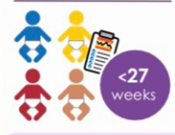
Place of birth
If you give birth at less than 27 weeks’ gestation, your baby will need very specialist neonatal care. Preterm babies who are born in a Neonatal Intensive Care Unit (NICU) are more likely to survive and are less likely to suffer brain haemorrhage than those babies who need to be transferred to a NICU after birth. For that reason, if you first come to St John’s Hospital and you are well enough to travel, we will arrange your transfer by ambulance to the Simpson Unit at the Royal Infirmary of Edinburgh, where there is a Neonatal Intensive Care Unit.
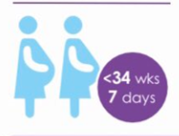
Steroids
If you are expected to give birth at less than 34 weeks’ gestation, you will be offered two injections of steroids 24 hours apart. Steroids protect your baby by improving the chance of survival, and reducing the chances of brain bleeding, lung conditions, and a serious bowel condition. The greatest benefit is when the first dose is given 48 hours before birth. There are no significant side effects for you or your baby, if you give birth preterm. You may experience temporary flushing or nausea.
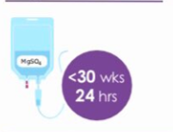
Magnesium sulphate
If you are expected to give birth at less than less than 30 weeks’ gestation you will be offered magnesium sulphate. This treatment, given through a drip, will reduce the chance of your baby suffering cerebral palsy, a brain condition that leads to lifelong disability. The greatest benefit is when the drip starts 4 hours before birth. You may experience a temporary burning feeling or nausea which stops when the drip stops. You will be monitored in labour ward while you receive the infusion.

Antibiotics
If you are in preterm labour, you will be offered an antibiotic to protect against Group B Streptococcus. This bacteria is commonly found in preterm labour and can threaten your life and that of your baby. The greatest benefit is when the antibiotic is given 4 hours before birth. There are no significant risks to receiving this dose of antibiotics.
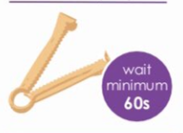
Optimal cord management
At birth the umbilical cord will be clamped after at least a minute has passed. This additional time increases the chance of your baby’s survival and may reduce the risk of brain bleeding and a serious bowel condition. Your baby will continue to receive oxygen through the placenta and will be monitored closely. You may be able to see and hear your baby and may even be able to touch your baby during this time. There are no significant risks to your baby from waiting this short time before clamping the cord.
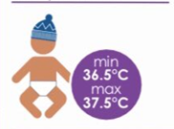
Stabilisation
The neonatal team will help your baby adapt to the outside world by encouraging your baby to start breathing, usually with some additional help and oxygen. The team will ensure your baby’s temperature remains normal. You will be able to touch your baby once your baby is stable and sometimes your baby may be stable enough for a cuddle.
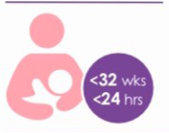
Breastmilk
Your breastmilk is like a medicine for your preterm baby and contains many substances which protect your baby outside the womb. Babies who receive their own mother’s milk are less likely to suffer life-threatening infections, serious bowel, lung and eye conditions, and they are more likely to have better brain development. You may not have previously considered providing breastmilk for your baby after birth but if you are admitted to hospital, we will offer you more information to support you in your choices about feeding your baby.
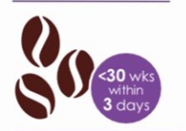
Caffeine
If you give birth less than 30 weeks’ gestation, we will give your baby a daily dose of caffeine until 34 weeks. This helps your baby breathe on their own but also protects the brain, making it more likely your baby will grow up without disability. Research shows there are no significant risks from receiving caffeine.
The Neonatal Unit
You may wish to visit the Neonatal Unit before you give birth, when possible. Please ask your midwife to arrange this for you. You can also take a ‘virtual tour’ of the Simpson Neonatal Unit in Edinburgh by visiting the Simpsons Special Care Babies website. The tour is available in 15 languages.
When a baby is born early, this can feel very worrying and emotional. It is good to talk and know that you are not alone. Please speak to your midwife or GP if you are struggling and worried about your mental wellbeing. Additional resources about mental health support available in NHS Lothian.
If your baby is born preterm anywhere in Scotland, NHS Health Boards can provide support for the costs of your travel, parking, and food through the Young Patient’s Families Fund.













